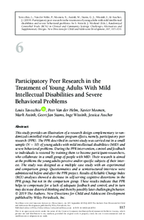Abstract
This study provides an illustration of a research design complementary to randomized controlled trial to evaluate program effects, namely, participatory peer research (PPR). The PPR described in current study was carried out in a small sample (N = 10) of young adults with mild intellectual disabilities (MID) and severe behavioral problems [in residential care in the Netherlands]. During the PPR intervention, control and feedback to individuals is restored by training them to become participant‐researchers, who collaborate in a small group of people with MID. Their research is aimed at the problems the young adults perceive and/or specific subjects of their interest. The study was designed as a multiple case study with an experimental and comparison group. Questionnaires and a semistructured interview were administered before and after the PPR project. Results of Reliable Change Index (RCI) analyses showed a decrease in self‐serving cognitive distortions in the PPR group, but not in the comparison group. These results indicate that PPR helps to compensate for a lack of adequate feedback and control, and in turn may decrease distorted thinking and thereby possibly later challenging behavior.

